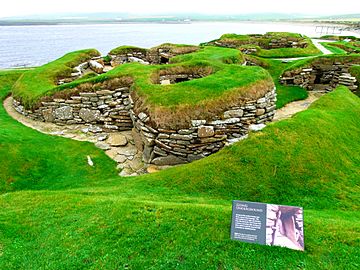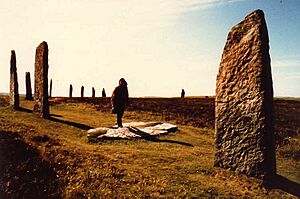Heart of Neolithic Orkney facts for kids
| UNESCO World Heritage Site | |
|---|---|

Excavated dwellings at Skara Brae, Europe's most complete Neolithic village.
|
|
| Location | Orkney, United Kingdom |
| Includes | |
| Criteria | Cultural: (i), (ii), (iii), (iv) |
| Inscription | 1999 (23rd Session) |
| Extensions | 2015 |
| Area | 15 ha (37 acres) |
| Buffer zone | 6,258 ha (15,460 acres) |
The Heart of Neolithic Orkney is a special group of ancient places on Mainland, one of the Orkney islands in Scotland. These sites are from the Neolithic period, which is also known as the New Stone Age. This was a time when people started farming and building large structures, long before metal tools were common.
In 1999, UNESCO named these sites a World Heritage Site. This means they are very important to everyone in the world and should be protected.
Contents
Exploring Ancient Orkney
There are five main places that make up the Heart of Neolithic Orkney. Each one tells us something amazing about the people who lived here thousands of years ago.
Skara Brae: An Ancient Village
Skara Brae is a village made up of ten houses. It is the best-preserved Neolithic village in Northern Europe. Imagine walking through streets and into homes that are over 5,000 years old! You can see stone beds, dressers, and storage boxes. This village gives us a clear picture of what life was like for people in the Stone Age.
Ring of Brodgar: A Stone Circle
The Ring of Brodgar is a huge stone circle. It is about 104 meters (341 feet) across. Originally, it had 60 standing stones. These stones were placed inside a circular ditch that was up to 3 meters (10 feet) deep and 10 meters (33 feet) wide. This type of monument is called a henge. Experts believe it took a lot of work to build, maybe around 80,000 hours of human effort!
Stones of Stenness: Tall Megaliths
The Standing stones of Stenness are another part of a henge monument. Today, only four large stones, called megaliths, are still standing. The tallest one is about 6 meters (19 feet) high. These impressive stones show how skilled the ancient people were at moving and setting up huge rocks.
Ness of Brodgar: A Hidden Gem
The Ness of Brodgar is an exciting archaeological site. It sits between the Ring of Brodgar and the Stones of Stenness. Digs here have found evidence of houses and decorated stone slabs. There's also a massive stone wall with deep foundations. One discovery is a very large building, which some people call a Neolithic 'cathedral'. It shows that these ancient people built very complex structures.
Maeshowe: A Special Tomb
Maeshowe is a unique chambered cairn and passage grave. A cairn is a mound of stones, and a passage grave has a long entrance leading to a central chamber. Maeshowe is built so that the sun shines directly into its central room during the winter solstice. This shows how much the Neolithic people understood the movements of the sun. Later, Vikings broke into Maeshowe. They left behind one of the largest collections of runic inscriptions in the world. Runes are ancient letters used by Germanic people.
Related pages
Images for kids
See also
 In Spanish: Corazón neolítico de las Orcadas para niños
In Spanish: Corazón neolítico de las Orcadas para niños
 | William M. Jackson |
 | Juan E. Gilbert |
 | Neil deGrasse Tyson |



